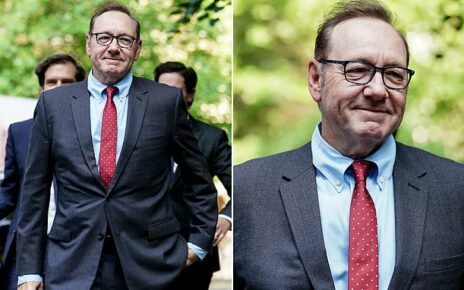Lizzo is addressing controversies and criticisms she's faced as she blazes her own path to musical stardom.
"My job as someone who has a platform is to reshape history," the "Good as Hell" singer said in Vanity Fair's November cover story. That's no small feat, but she seems up for the challenge, using the interview to get candid on a range of topics, including politics, abortion rights, race and, on the lighter side, her romance with "life mate" Myke Wright.
Lizzo campaigned and voted for Joe Biden, "But the fact is," she said, "I don’t know what they’re doing. I see they’re listening, but we’re in a post–thoughts and prayers society. Thoughts and prayers just don’t f***ing cut it anymore. I’m not condemning this current administration. I’m just very curious as to what kind of real steps they can take."
https://www.instagram.com/p/Cjkp8EONRrb”>View this post on Instagram
A post shared by Vanity Fair (@vanityfair)
It's led her to take her own real steps. For instance, after the Roe vs. Wade ruling, she reached out to Planned Parenthood and National Network of Abortion Funds to see how she could really help. She was told financial support, so she donated $500,000 to defend abortion rights, and tour promoter Live Nation matched it.
"I know plenty of people who would have died if they hadn’t had that procedure," Lizzo said. And while she didn't have a personal experience with abortion, she said, "It shouldn’t matter if I had a personal experience or knew somebody; it shouldn’t matter what my opinion is. Opinions is what got us in this s*** in the first place — what people think people should be doing with their bodies. These days, we don’t create laws that support people having health care, never mind abortions. How about letting people have access and resources and mind their f***ing business?"
She continued, "The Supreme Court has politicized law and made it a weapon against human rights. An overwhelming amount of people did not agree with what the Supreme Court did. It’s about power and control. It’s about white male supremacy; it’s always been about white male supremacy in this country and the people who are complicit in helping uphold it — who are a lot of white women. The women who voted for Donald Trump."
https://www.instagram.com/p/Cjkvlw3Nd9S”>View this post on Instagram
A post shared by Vanity Fair (@vanityfair)
Lizzo went on to criticize the "façade" of "'America, we’re all in this together.' No, we’re not. Black people have been dehumanized so much — especially Black women. I’d like to be an optimist, but I’m a chronically disappointed optimist. The way Black women have been treated in this country has made me feel very hopeless. I don’t think there was a time when [we] were treated fairly and with respect. If I see hope in this country, it will come from the accountability of the people who have the privilege. As a fat Black woman, this country has never gone forward; it’s stayed pretty much the same for me."
The singer, born Melissa Viviane Jefferson in Detroit who was later raised in Houston, talked about being scared to drive as a teen because she had been pulled over so many times.
"I’ve been pulled over, I’ve been handcuffed," she said. "They do ‘License and registration, okay, everything looks good, you’re good to go.’ ‘Ma’am, can you just step out the vehicle real quick?'"
What drives her activism and outspokenness on these topics is, "I don’t want to leave history in the hands of people who uphold oppression and racism. My job as someone who has a platform is to reshape history."
https://www.instagram.com/p/Cjk4gd6A9mO”>View this post on Instagram
A post shared by Vanity Fair (@vanityfair)
As a flute-playing, body-positive, bold voice in the entertainment world, she's been the target of criticism. One thing that bothers her the most is the claim that she makes her music for white listeners.
"That is probably the biggest criticism I’ve received, and it is such a critical conversation when it comes to Black artists," she said. "When Black people see a lot of white people in the audience, they think, Well this isn’t for me, this is for them. The thing is, when a Black artist reaches a certain level of popularity, it’s going to be a predominantly white crowd. I was so startled when I watched [YouTube clips of gospel great] Sister Rosetta Tharpe, who was an innovator of rock and roll. She was like 'I’m going to take gospel and shred guitar,’ and when they turned the camera around, it was a completely white audience. Tina Turner, when she played arenas — white audience. This has happened to so many Black artists: Diana Ross, Whitney, Beyoncé… Rap artists now, those audiences are overwhelmingly white."
Lizzo said she is "not making music for white people. I am a Black woman, I am making music from my Black experience, for me to heal myself [from] the experience we call life. If I can help other people, hell yeah. Because we are the most marginalized and neglected people in this country. We need self-love and self-love anthems more than anybody. So am I making music for that girl right there who looks like me, who grew up in a city where she was under-appreciated and picked on and made to feel unbeautiful? Yes. It blows my mind when people say I’m not making music from a Black perspective — how could I not do that as a Black artist?"
https://www.instagram.com/p/Cjkz1lRNN9B”>View this post on Instagram
A post shared by Vanity Fair (@vanityfair)
Another topic she tackled was changing the "Grrrls" lyrics in June to remove the ableist slur "spaz." (The word is a derogatory term for spastic diplegia, a form of cerebral palsy, which makes it difficult for people to control some muscles.)
"I’d never heard it used as a slur against disabled people, never ever," she said. "The music I make is in the business of feeling good and being authentic to me. Using a slur is unauthentic to me, but I did not know it was a slur. It’s a word I’ve heard a lot, especially in rap songs, and with my Black friends and in my Black circles: It means to go off, turn up. I used [it as a] verb, not as a noun or adjective. I used it in the way that it’s used in the Black community. The internet brought it to my attention, but that wouldn’t [have been enough] to make me change something."
After she changed it, she faced was criticized again by some people who said artists shouldn’t change lyrics.
"Nina Simone changed lyrics — is she not an artist?" she replied. "Language changes generationally; Nina Simone said you cannot be an artist and not reflect the times. So am I not being an artist and reflecting the times and learning, listening to people, and making a conscious change in the way we treat language, and help people in the way we treat people in the future?" (Beyoncé later followed suit, changing her lyric as well.)
The conversation was not all controversial topics, however. She also spoke about her relationship with Myke Wright, whom she said she has known for over six years.
"He’s everything," she said of her partner, whom she described as a comedian, actor, musician and artist. "We’re just in love. And that’s it."
She also clarified her stance on monogamy after saying in a July interview that she didn't believe in it.
"Is monogamy a religion? People fight for monogamy like they pray to it every day," she said. "I am not a polyamorous person, I’m not in love with multiple partners. That is not me. He’s the love of my life. We are life mates. Do I want to get married? If I wanted to start a business with him, I’d get married because that’s when your finances come together. I like weddings. I would like to have a wedding over a marriage. I’m not thinking about sex when I think about monogamy and rules. I’m thinking about the autonomy and independence of him and me. How wonderful would it be to be this complete independent person and to come together to make two complete independent people? Not that whole ‘You complete me, you’re my other half.’ No. I’m whole, and you’re incredible too. We’re like the mirror image of each other. We’re connected. But that doesn’t mean I was incomplete when I met him."
Source: Read Full Article


